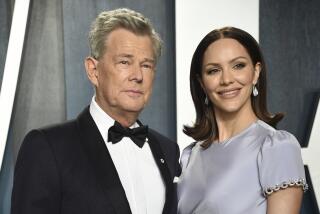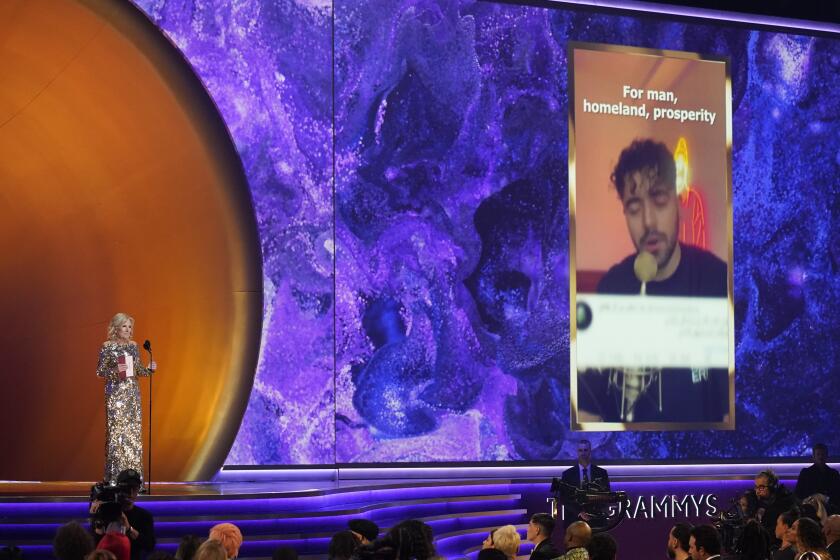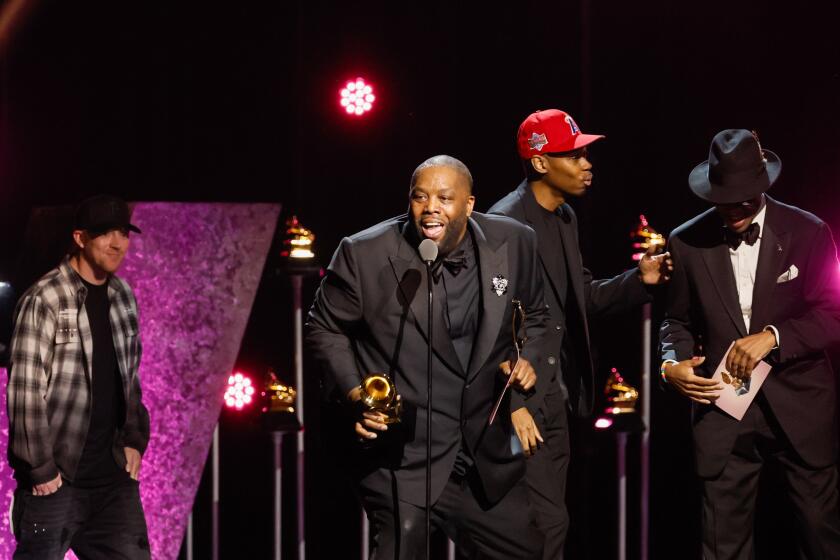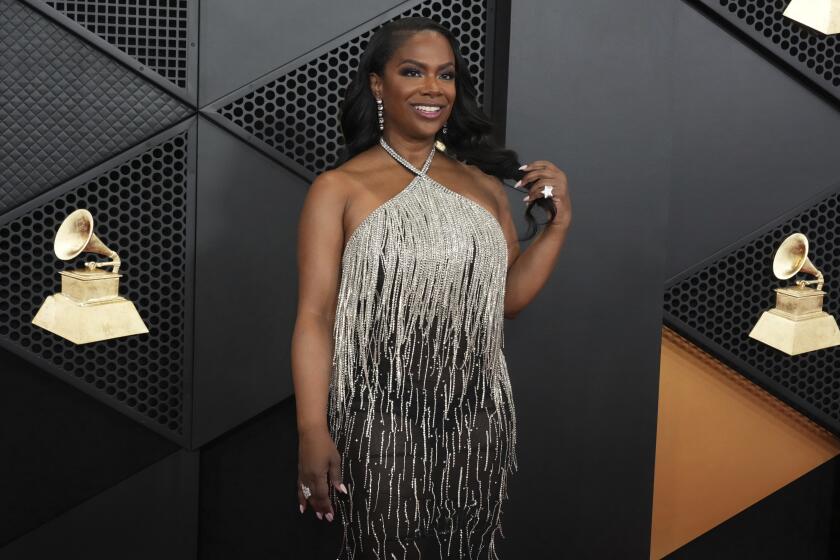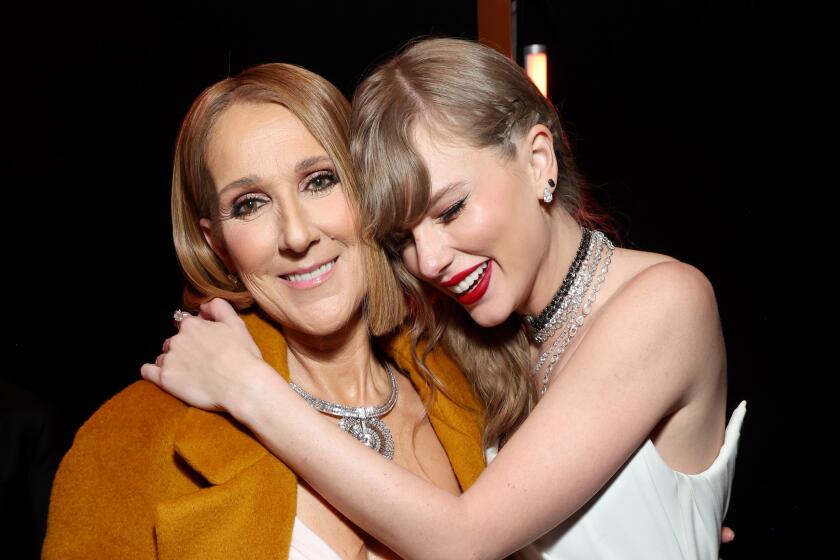Starbucks Gives a Caffeine Jolt to Sales of CD
There are many paths to Grammy glory -- the world’s grand concert halls, the elite recording studios of Los Angeles, Nashville’s storied Music Row. But the caffeinated confines of your neighborhood Starbucks?
When “Genius Loves Company,” the duets album that became the final work of the late Ray Charles, garnered nominations Tuesday in the marquee Grammy categories of album and record of the year, it didn’t just add to the 2004 outpouring of appreciation for the singer. It also marked the first time a Grammy contender was brewed up to be sold alongside mocha Frappuccinos and grande nonfat lattes.
For the record:
12:00 a.m. Dec. 10, 2004 For The Record
Los Angeles Times Friday December 10, 2004 Home Edition Main News Part A Page 2 National Desk 1 inches; 45 words Type of Material: Correction
Starbucks effect -- A chart with an article in Wednesday’s Section A about CD sales in Starbucks outlets showed dollar signs in front of figures labeled “Album sales.” The figures represented the number of albums sold, in millions, not the dollar receipts from those sales.
Starbucks, a partner in the financing and marketing of “Genius,” has sold more copies of the CD than any other individual retailer. The fact that the coffee purveyor has rung up more than 350,000 copies of “Genius” (and, at $15.95, sold them at a steeper price than most mainstream music retailers) has been eye-opening for some music industry stalwarts.
“It’s another nail in the coffin of traditional music retailers,” said one major-label executive who asked for anonymity because of his voting status in the National Academy of Recording Arts and Sciences, which awards the Grammys. “They take this as yet another party taking a bite at their apple.”
Or maybe not. Geoff Mayfield, the director of charts for Billboard, the music trade publication, said the buyer who picked up “Genius” in Starbucks was probably one who would otherwise not be buying it at all.
“The market they isolate there is people who don’t spend a lot of time in music stores and it’s an impulse purchase,” Mayfield said, pointing out that diligent music fans probably would pass on the coffee chain’s top-tier prices for CDs. “I haven’t heard a lot of protest from traditional retailers.”
In either case, “Genius” has sold 1.3 million copies, and the role of Starbucks in that platinum success story is more than just purchase-point trivia -- it represents the all-bets-are-off landscape of the music marketplace in the new age when iPods, streaming media, ring tones, song downloads and file sharing have changed the very idea of music consumerism.
More specifically, it amps up the trend of nonmusic retailers such as Victoria’s Secret, Pottery Barn and Anthropologie using their own CD titles to lure customers and shape their brands. Most of those packages have been compilations of previously released music, though, and not the work of an in-house record label.
Starbucks and its Hear Music imprint have gone well beyond the typical model in “Genius” by joining forces with the small jazz label Concord Records. The closest similar effort might be Best Buy’s involvement in new albums by classic rock acts, but Best Buy is a major music retailer, not a brewer of coffee.
“It’s a unique collaboration, and it’s at a time when the traditional way of the music business is in turmoil,” said Ken Lombard, president of music and entertainment for Starbucks.
Starbucks created the artwork for the album and created much of its marketing program. Perhaps most important, the chain gave the music intense airplay within its 6,100 U.S. locations from Maine to Maui.
“The way people discover and buy their music is evolving,” Lombard said, “and a big part of our model is to make it comfortable for discovery.”
The idea of Starbucks -- to many a symbol of corporate ubiquity -- as music boutique makes some independent retailers roll their eyes, but one of them, Rand Foster, owner of Fingerprints in Long Beach, said the Hear Music selections were well done, and he liked “seeing people buy good music.”
“Although,” he added, “as a music store owner, clearly I don’t like seeing more competition.”
Foster, a board member of the Coalition of Independent Music Stores and a merchant who shares the 2nd Street shopping corridor with two Starbucks, said the chain’s limited number of titles and top-tier prices made them far less a threat to small shops than the mass merchandisers who sold albums at a loss to lure customers for other purchases.
“It is clear, though, that they were really serious with this Charles CD; they were more aggressive with it than anything they had done before,” Foster said.
Surveys of Starbucks customers, conducted a few months ago by Evans Research, show that half of its clientele reported buying at least one CD in the last six months -- but of those, 15% identified traditional music retailers as the place where they bought most of their music.
At any Starbucks, customers are greeted by small counter racks that hold CDs varying from Christmas classics to the popular Artist’s Choice series, which features well-known music stars putting together CDs of songs they consider their personal influences and favorites.
“Genius,” released in September, broke those molds and was a quick hit -- it debuted at No. 2 on the nation’s pop charts in its first week in release.
A number of factors made “Genius” the perfect release to follow the Starbucks path: The success of “Ray,” this year’s Hollywood biopic of acclaim, and the outpouring of attention and affection that marked the June death of the 73-year-old singer caught fans’ ears in a big way, and the duet disc features Norah Jones, Bonnie Raitt, Elton John and other artists who are strong draws for the coffee chain’s demographic. The album sold so briskly in its first week that many Starbucks locations sold out and the chain had to scramble to order more.
When the project came up, Charles was like many veteran artists who find it hard to win the attention or resources of a major label. Even though similar duet albums had done well as career tonics for Santana, Frank Sinatra and Tony Bennett, the Charles project was not one that had labels beating down the door.
The one that took the leap along with the Starbucks imprint Hear Music is Concord -- a 30-year-old label that has been home in past years to Mel Torme, Rosemary Clooney and Tito Puente and has a current roster that includes Barry Manilow, Peter Cincotti and Michael Feinstein.
To have a share of the success Tuesday was “incredible for us, just something that makes you speechless,” said John Burke, an executive and producer for the label.
“Genius” is the first collaboration between Concord and Hear Music, which began in 1990 as a store chain and label specializing in compilation CDs that mined classic songs and new works outside the commercial mainstream.
Starbucks, which started selling select CDs in 1995, bought the Bay Area company in 1999 for $8 million and got into the business of making its own albums. This year, Starbucks released 16 titles and, to date, “Genius” is easily its most significant release.
Was “Genius” a singular success or a template for the future? It may not take long to find out.
“It has caught the attention of a lot of people in the music industry and a lot of artists, and we’ve been hearing from them,” Lombard said, although he declined to cite specific projects because of the early stages of their discussions. “You’re going to see a lot more titles added. Music is an added value to the Starbucks experience. You’re not going to feel you’re in a music store. But we have a very, very powerful place in the lives of our customers.”
Lombard is well aware of the importance of core-business focus and the stumbles of past kiosk experiments, such as Blockbuster’s failed attempt to sell CDs from vending machines.
“We are in the coffee business; that’s not going to change,” he said, “but we are also open to helping our customers find music they want and will like.”
In Seattle and Austin, Texas, some Starbucks are experimenting with kiosks that allow customers to peruse a selection of 200,000 songs and pick and choose tracks for a tailored CD that is produced on the spot and paid for via the swipe of a credit card. The company has said it plans to put the CD burners in 2,500 stores in the next few years.
And it has announced an aggressive expansion that would set as its goal 30,000 stores worldwide -- triple its international total today. That could make Starbucks a heftier player in music retail, a sector that has been shriveling in recent years.
Starbucks’ Hear Music also launched a channel this year on the XM Satellite Radio network, and a Hear Music Coffeehouse -- with 68 music listening stations -- opened in Santa Monica in March.
The brand has won credibility, Burke said, especially with adults who do not feel well-served by youth-skewing radio and have hectic schedules that make it difficult to stay up on music trends or carve out time to meander through the aisles of music stores.
The customers who frequent the chain also have enough disposable income to pay $3 for a coffee drink. And at the coffee shop, a bit of downtime awaiting the latte froth adds up to a potent captive audience.
“How long does it take to make a drink? In 3 1/2 minutes you can hear most of any song on ‘Genius Loves Company’ in its entirety, so perhaps that’s the sweet spot,” Burke said, chuckling. “Three-and-a-half minutes. That’s our new criteria for making albums.”
More to Read
The biggest entertainment stories
Get our big stories about Hollywood, film, television, music, arts, culture and more right in your inbox as soon as they publish.
You may occasionally receive promotional content from the Los Angeles Times.


